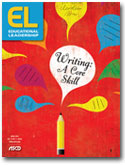What motivates people to invest in something that's inherently difficult? It's a question that dynamic teachers keep close to them as they set about teaching young people to learn math or a new language or music or history—or writing.
There's no single answer to the question, of course, because people vary. One student will give himself to an endeavor that remains aversive to another. One teacher enlivens a topic differently than another. Nonetheless, we know some things about how young learners come to identify with a particular content area or form of expression.
Our own stories can provide clues. As a high schooler, I deplored Latin and marked days off on a calendar until I completed Latin II and deemed myself rid of Latin for all my days. I then took German, partly because I needed two more years of a language in high school, but mostly because the Latin II teacher told us on the final day of class that if we elected not to continue with Latin, we should certainly opt to take Spanish or French—rather than German—because of their kinship to Latin. I signed up for German I that same day.
I came to love German, however, because my teacher thought I was a promising student. At a time when I was devoid of self-confidence, she saw possibilities in me. That hope was water in an arid adolescence, and it became forever linked for me with the German language. I majored in German in college.
I understand now, of course, that I studied German obsessively in that high school class because I didn't want to disappoint the teacher, who believed in me when I had no belief in myself. My effort led to success, and the new exhilaration of success was too heady to let go of. In other words, I had a positive experience with a subject from which I expected little, and that experience recruited me for the long haul.
Recruitment Strategies
Recruiting is necessary in getting students to write because writing is difficult both physically and mentally. Pushing a pencil with the hope that it will channel something sensible from the brain to a stark piece of paper isn't a natural pursuit for most young people—particularly at a time in history typified by speed and brevity of communication.
Nonetheless, as we settle into the era of the Common Core standards, there is a renewed emphasis on writing across content areas. The introduction to the Common Core standards in English language arts asserts that skill in writing is an essential element in developing within students cogent reasoning and the use of evidence, two skills necessary for "private deliberation and responsible citizenship in a democratic republic."
There is little question that developing the attitudes and skills of a proficient writer benefits an individual's intellectual development. The question is how teachers can recruit the broadest possible spectrum of students into the sustained effort necessary to invest in that intellectual development. We need to turn students on to writing at a very young age—and then avoid turning them off for the decade-plus of schooling that follows.
Why Do Famous Writers Write?
There's wisdom in listening to what some writers say drew them to writing—and why they persist in this solitary pursuit. I looked at an array of books in which authors write about writing, as well as websites featuring quotations from authors. Although the answers I found are wide-ranging, there's a pattern here that might guide teachers whose job is to commend writing as worth the effort it requires.
Ray Bradbury says writing is playing, and James Thurber says it's having fun.
Susan Minot says writing is a way of being alone and finding out what's going on inside herself.
bell hooks says people write because language is the way we keep hold on life.
John Dos Passos explains that he writes because it lets him get things off his chest. What is collected, he says, must be gotten rid of.
Ntozake Shange writes to ensure that her history isn't erased.
Carl Sagan saw writing as a way to make science accessible to non-scientists. When you're in love, he reminds us, you want to tell the world.
William Safire says writing forces him to think more cogently than when he's just shooting off his mouth.
Coleman Barks says writing makes the psyche a guesthouse of emotions.
Madeline L'Engle says we write because we are story people and must tell our stories.
Richard Peck says we write to see how the story ends.
Lorna Dee Cervantes says writing is an exercise of freedom—freedom that gets stronger the more she exercises it.
Robert Pinsky notes that he writes with his voice and finds it like improvising with jazz.
John Ciardi counsels that writing and learning are both fun—and that children are full of an enormous relish for both.
These authors write about science and history and current events. They write novels, poetry, short stories, and nonfiction. Their assorted reflections have one thing in common. Writing—real writing, the kind that signs us on for the long haul—touches us. It fulfills a human longing. It is rich with purpose. It makes us more fully human. It is, in some important way, a hopeful experience.
Good things to remember as we plan to recruit young writers.

